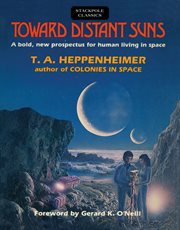Nonfiction
eBook
Details
PUBLISHED
Made available through hoopla
DESCRIPTION
1 online resource
ISBN/ISSN
LANGUAGE
NOTES
The prospectus of humans living, working, and establishing communities in space can no longer be dismissed as the romantic notions of science fiction writers and space buffs. With the launch of the space shuttle human kind will enter a new era in space exploration, one giant step closer to the goal of human colonization. Our understanding of man's role in space is maturing, and the myths of life in space as a slick Buck Rogers episode or a scene from Star Wars must give way to a realistic plan for human life in other part of the solar system. We are ready now for a factual assessment of the challenges ahead: in Toward Distant Suns, the prospects of space exploration and space colonization have come of age. Here, for the first time, is a realistic look at what humankind must accomplish in order to colonize near space. Based on the most up-to-date research available, Toward Distant Suns tackles the problems of technology and lifestyle that will face those men and women whose mission is to settle space. Here is realistic, in-depth coverage of: space shuttle's role in near space construction, development of new, more versatile rocket fuels and motors, building the large communications platforms, power satellites the "Space Spider," and space colonies, the space workers-how they will be chosen, trained, and transported; life in zero-g-space tourism and space war; "suburbanizing" space earth dwellers; the real future of interstellar colonization Toward Distant Suns also takes a new look at the tantalizing question: What is our place in the galaxy? It reviews the Search for Extraterrestrial Intelligence experiments, the latest work on interstellar flight and colonization, and the current scientific information on planetary formation and humanoid development, to reach the startling conclusion: Mankind may be unique and along
Mode of access: World Wide Web







